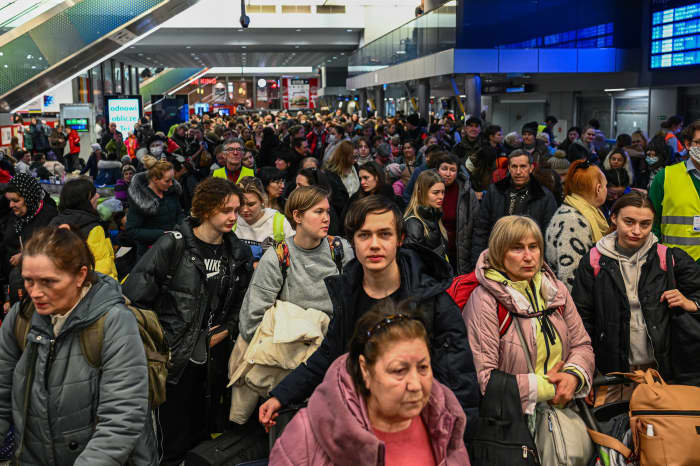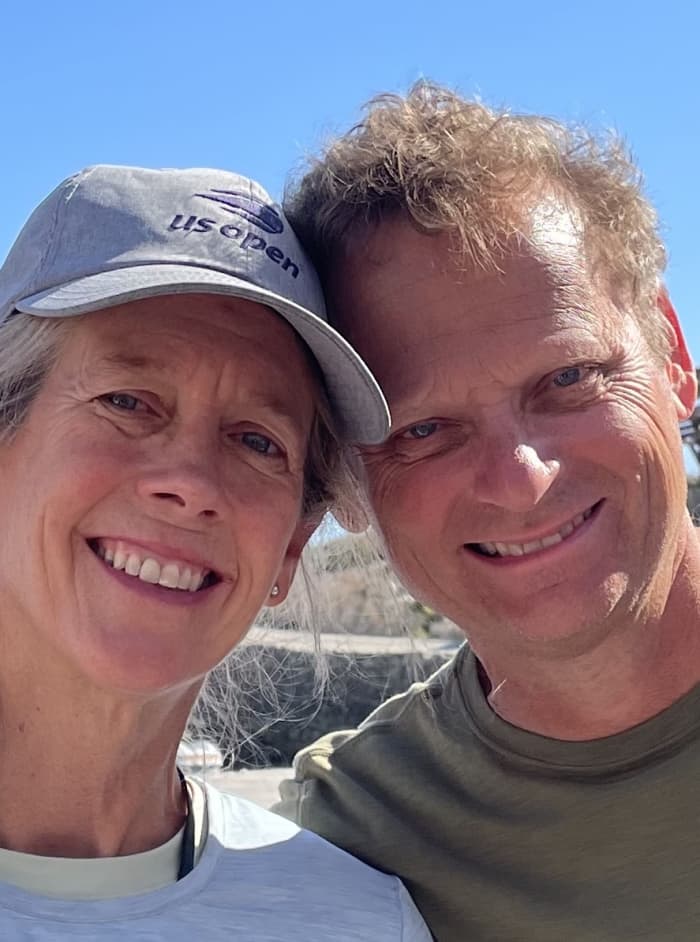This post was originally published on this site
When Dale Perry started his long journey to the Ukraine border, he had no idea he’d be launching a humanitarian mission. As Russian forces were massing in February, Perry, the American co-owner of a Kyiv-based energy trading company, was about as far as one can travel from Ukraine, vacationing on a remote French Polynesian island. With tensions mounting, he cut the vacation short, headed back through the Seattle area, where he lives on Bainbridge Island, then to Europe, focused largely on ensuring the safety of his Ukraine-based employees. He brought a suit and tie, hoping to attend a gathering scheduled for that Friday, Feb. 25, to celebrate the arrival in Poland of a U.S. liquefied natural gas shipment bound for Ukraine.
Before that celebration could happen, missiles started hitting Ukraine. Perry was holed up in a hotel on a stopover in Amsterdam, texting his Ukrainian partner and watching the war, he says, on TV. By early Sunday morning, he had dropped his suit and tie at the hotel reception desk and departed for Poland, where he rented a car and drove toward the Ukraine border. Some employees of his company’s Polish business partner had already identified a medical-supply company owner, he says, who was willing to open up his warehouse on a Sunday. Perry gave him $100,000 cash as a deposit until banks opened the next day, he says, and loaded up several truckloads of medicine, surgical kits and other supplies. Late that night, Perry and his small team got the trucks safely through a small Ukrainian border checkpoint at Kroscienko, to be met on the other side by Ukrainian partners.
It was the start of an effort that within two weeks would send more than $2 million worth of aid into Ukraine, fueled by Perry’s powers of persuasion, a handful of employees and volunteers in Poland and Ukraine, and a social media and online fundraising campaign orchestrated by a few family members and friends back in the U.S.. Perry was willing to do “whatever it took,” he says, to get supplies flowing into the country. “I’m not good at taking ‘no,’” he says. “You tell me on Sunday stores aren’t supposed to be open. Let’s call the person who owns them.”
Few Americans have done more than Perry to try to empower post-Soviet states. He has gone about his efforts on the ground in countries like Kazakhstan and Ukraine, not from think tanks in Washington or California universities. Over the last two decades, Perry has worked to increase energy production in Kazakhstan and Ukraine and lessen dependence on Russian energy imports. From powerful oligarchs to political controversy leading back to the White House, Perry navigated everything this region of the world could throw at him. But he never expected to be leading a grassroots humanitarian effort in the face of a Russian military invasion.
Perry’s effort is part of a much broader mosaic of grassroots humanitarian aid for Ukraine organized by millions of people around the world. It’s “the most efficient, fastest response I’ve seen in 15 years” of studying such efforts, says Elizabeth Cullen Dunn, director of Indiana University’s Center for Refugee Studies, who spoke with MarketWatch from Korczowa, Poland, where she’s researching grassroots aid along the Ukrainian border. While large international aid organizations can get bogged down in paperwork and often offer a standardized, one-size-fits-all response, she says, social media is fueling grassroots efforts that can get the right types of aid to those in need at the right time. A Polish-language Facebook group focused on Ukraine aid, she notes, has more than 500,000 members. It’s “the digital disruption of humanitarian aid,” she says, “in the same way the digital revolution has disrupted music, journalism and other industries.”
The drawback, Dunn says, is that these grassroots efforts typically can’t sustain their momentum for long. “Compassion fatigue” will set in, she says, and large international aid organizations will play an important role in managing the prolonged crisis as people will remain displaced for years, not weeks. About 2 million people are now displaced within Ukraine, according to the United Nations, while 3 million people have fled the country.

People who fled the war in Ukraine walk towards a humanitarian train to relocate refugees on March 15, 2022 in Krakow, Poland.
Omar Marques/Getty Images
‘I try to strip out corruption from businesses in the energy sector’
At age 60, Perry is no stranger to post-Soviet states and their geopolitical tensions. Raised in Coeur d’Alene, Idaho, he studied Russian and engineering at Dartmouth College and traveled to the Soviet Union to spend a summer abroad in Leningrad (now St. Petersburg) in 1982. He came home with a strong desire to defend his country from what he saw as “a threatening system, from a patriotic point of view,” he says, joining the U.S. Navy and serving on fast-attack submarines through the late 1980s. His Russian and engineering background later helped him land a job as a group manager for the power company AES Corp
AES,
There, he managed operations and business development in central Asia and Russia, including the biggest power plant in Kazakhstan.
Working in Kazakhstan, where he regularly pushed up against corrupt actors, he says, he developed a theme that would permeate his whole career: “I try to strip out corruption from businesses in the energy sector,” he says, which ultimately lowers prices for consumers.
That mission took on a new level of personal risk, he says, when he no longer had a major U.S. corporation standing behind him. In 2014, the year that a Ukrainian revolution sparked anti-corruption reform efforts, Perry and his partner launched Energy Resources of Ukraine (ERU), which has focused in part on importing natural gas to Ukraine, reducing the country’s reliance on Russian gas. Anticipating the potential risks of running a business that conflicts with Russian interests, he says, he built up a stash of cash that could be tapped if ERU people needed to flee Ukraine.
Perry’s ties with the Ukrainian energy industry led him to play a role in a U.S. political dustup during the Trump administration. In an Oct. 2019 deposition before U.S. House impeachment investigators, former U.S. ambassador to Ukraine Marie Yovanovitch said a letter written by Perry earlier that year described a March 2019 meeting that involved Lev Parnas and Igor Fruman. The two Florida businessmen and one-time associates of former Trump lawyer Rudy Giuliani had gotten together with an executive of Ukraine government-owned energy company Naftogaz. The letter indicated that Parnas and Fruman wanted a new head of Naftogaz as well as a new U.S. ambassador to Ukraine, Yovanovitch told the investigators. Parnas was convicted by a jury in federal court last year of illegally funneling foreign money into U.S. elections, and Fruman, who pleaded guilty last year to soliciting foreign campaign contributions, was sentenced early this year to a year in prison. An attorney for Fruman declined to comment. Attorneys for Parnas and Giuliani did not respond to requests for comment.

Dale Perry with his wife, Carol.
Courtesy of the Perry family
‘Clearly it has taken a toll on him’
As Perry ramped up his humanitarian aid efforts late last month, a network of his employees, family and friends swung into action. His wife, Carol, posted updates on Facebook and fielded offers of supply donations that came flooding in. His daughter, Rachel, set up a website to promote the cause, regularly posting photos and videos of supplies going over the border, as well as an online fundraising platform, which has now raised close to $500,000. “People can see and understand that their donations have an immediate impact,” Rachel Perry says. Dale Perry and his partner donated $2 million to the cause, he says.
Perry and his small team in Poland sourced medicine, surgical kits, baby food, diapers, flour, tents, sleeping bags and other supplies. The cash he’d stashed away in case of emergency, Perry says, was put to work as deposits for supplies.
Security is a constant concern. The owners of the trucks that bring the supplies to the border don’t want their vehicles driving far into Ukraine, so the team drives the trucks just across the border, where they’re met by a team from the Ukrainian side, and the supplies are shifted onto Ukrainian trucks. The Ukrainian team hands over a shopping list of additional supplies needed, and the process repeats daily, Perry says.
While waiting to get the supply trucks through the relatively small checkpoint, Perry says, he watched refugees streaming into Poland. Within 10 days of his arrival at the border, he estimates that he saw 25,000 to 30,000 women and children walk through the checkpoint. “You can’t help but contemplate what that means for each and every one” of the refugees, says Carol Perry, his wife. “Clearly it has taken a toll on him.”
Perry was reluctant to leave the border, he says, until he was confident that the work would continue in his absence. He grew frustrated that he wasn’t seeing more activity from the larger international aid organizations. “We’re trying to put ourselves out of business,” by handing off the work to the aid professionals, he says. He connected with Americares, a health-focused relief and development nonprofit. Perry helped the group connect with a medical-supply vendor in Poland and truckers who were moving supplies across the border quickly, says Adam Keehn, Americares field team leader in Poland. Early this week, Americares had a three-ton shipment of medical supplies headed across the border to western Ukraine, Keehn says.
By last week, the last of the ERU employees who had the desire and ability to leave Ukraine had made it out of the country. A dozen male employees are not allowed to leave Ukraine, and several others have chosen to remain.
This week, Perry briefly returned to the U.S. to plan for the future. He expects to head back to Poland this weekend. The aid efforts will continue, he and his family say, as will ERU’s work supplying natural gas to Ukraine and neighboring countries.



